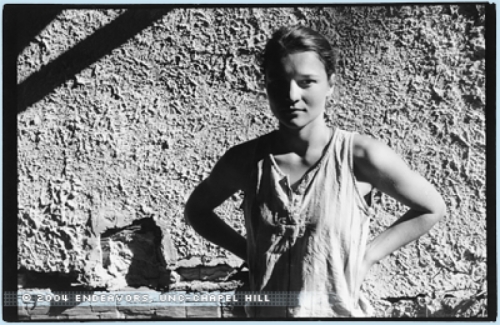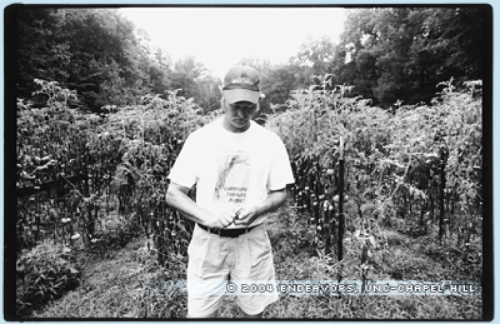“I’m not a farmer,” Brad Horn says. “I mean, I’ve worked on farms, but my interest is more in the people.”
Horn is a Carolina undergraduate studying documentary work through a self-designed major in interdisciplinary studies. He and a crew of other students and community members premiered Stewards of the Land, a multimedia documentary project, last spring. The project, now accessible on-line at www.stewardsoftheland.org, presents portraits of six local farmers through photographs, text, and short audio documentaries.
“Each farmer filled a certain niche,” Horn says. Each contributed certain things, Horn says, “to weave a larger tapestry than just their own little square.” The farmers are male and female, young and older, lifetime farmers or new to the work.
But there are many similarities as well. All of the farmers profiled by the project run small-scale, local operations. They use their products themselves or sell them to the community at places such as the Carrboro Farmers’ Market. They farm using a range of methods they call organic, traditional, and “sustainable” — environmentally, socially, and economically sound.
Elise Margoles also runs a community-supported agriculture (CSA) program from her farm, Elysian Fields. A CSA is essentially a partnership between consumers and farmers. A consumer pays the farmer a fee at the beginning of the season to help support the purchase of seeds and other supplies. In return he or she receives weekly boxes of the farm’s fruits and vegetables.
“Farming is a risk every year,” Margoles says. “The idea of the CSA is that people know that that’s how farming is, and they’re saying, ‘We’re willing to take on this risk with you.’” Margoles’ CSA is very popular and successful — its membership doubled, from fifty in 2002 to one hundred in 2003, in only the third season Margoles has been farming her own land. In 2001 she bought her forty-five-acre farm in Cedar Grove, North Carolina, to “live the model, live how I want to live, and prove that you can make a living farming and that people can eat locally and seasonally.”
North Carolina’s Triangle area is an especially good place to be a local farmer, Margoles says. In spite of competition from many other local growers, recent slumps in the economy, and an overly rainy spring this past season, Margoles is able to make her living through farming. “There are a lot of people here who are aware of the fact that organic food, local food, is something that is good for them and that they want to support,” Margoles says. And the Carrboro Farmers’ Market, at which all products sold are produced by those selling them, is nationally known as one of the top farmer-run markets in the country. “It’s a really good market to get in on,” Margoles says.
“The people who are doing this work are pioneers and idealists,” Horn says. His own ideals were the impetus behind the Stewards of the Land project. “We wanted to celebrate what these farmers are doing, to raise consciousness about the solutions they are presenting,” Horn says. “It’s imperative that we find an alternative to agriculture that uses petrochemicals in every step of the process, from the fertilizers in the fields to the fuels used to harvest and ship the produce three thousand-plus miles to the consumer.”
Margoles feels that the project helped cement her relationships with customers. Even if people already buy locally and organically, they don’t always know all the facts about local agriculture — information about what crops can and cannot be grown in North Carolina and the backgrounds and services of local farmers. “There’s always more that you could introduce,” Margoles says. “And at the farmers’ market, sometimes it can be so busy that you’re just like, ‘Five twenty-five. Here’s the change.’” After the project’s premiere in April 2003, many people mentioned it to her at the market. “It was really nice. A lot of them came up to me and said, ‘Oh, I didn’t know this about you.’”
Michelle Coppedge was formerly a staff writer for Endeavors.
The Stewards of the Land Multimedia Documentary Project showed at the Carrboro Century Center in April 2003 in conjunction with the Carolina Farm Stewardship Association’s annual Piedmont Farm Tour. It is now accessible on-line and will be archived in UNC-Chapel Hill’s Southern Folklife Collection in January 2004. Farmers featured are Harvey Harman, Alex and Betsy Hitt, Stanley Hughes, Elise Margoles, Steven Moize, and Nena Woody. In addition to Horn, project collaborators are Tes Thraves, a doctoral student in communication studies at Carolina; Mike Nutt, a Carolina undergraduate in communication studies; J.L. Reid, a recent Carolina communication-studies student; Heather Barnes; Cathy Leicht; and jj richardson. Funding for the project came from the Educational Media Foundation, Inc., Weaver Street Market, and a Bryan Academic Fellowship from UNC-Chapel Hill’s APPLES Service-Learning Program and the Carolina Center for Public Service.






